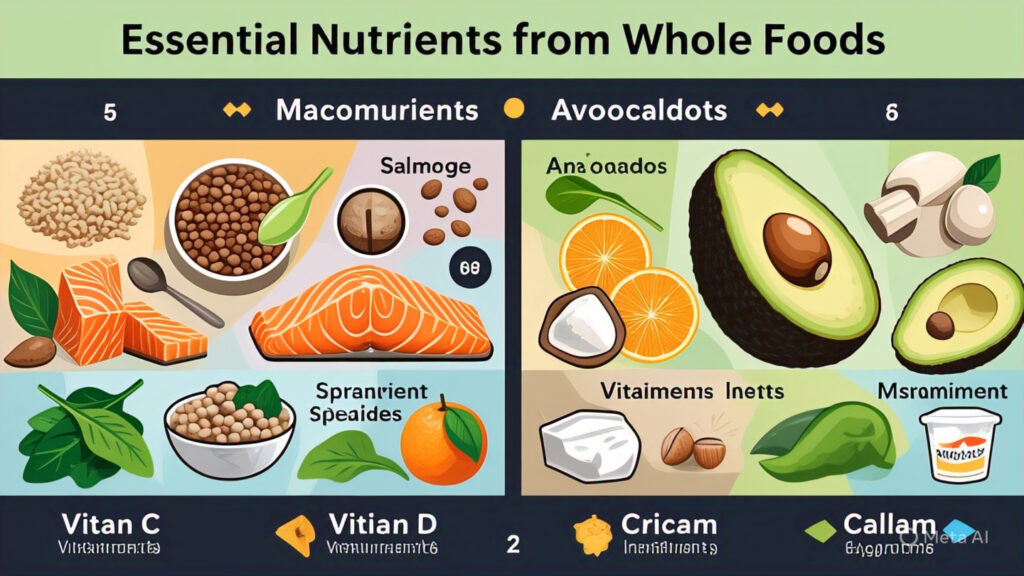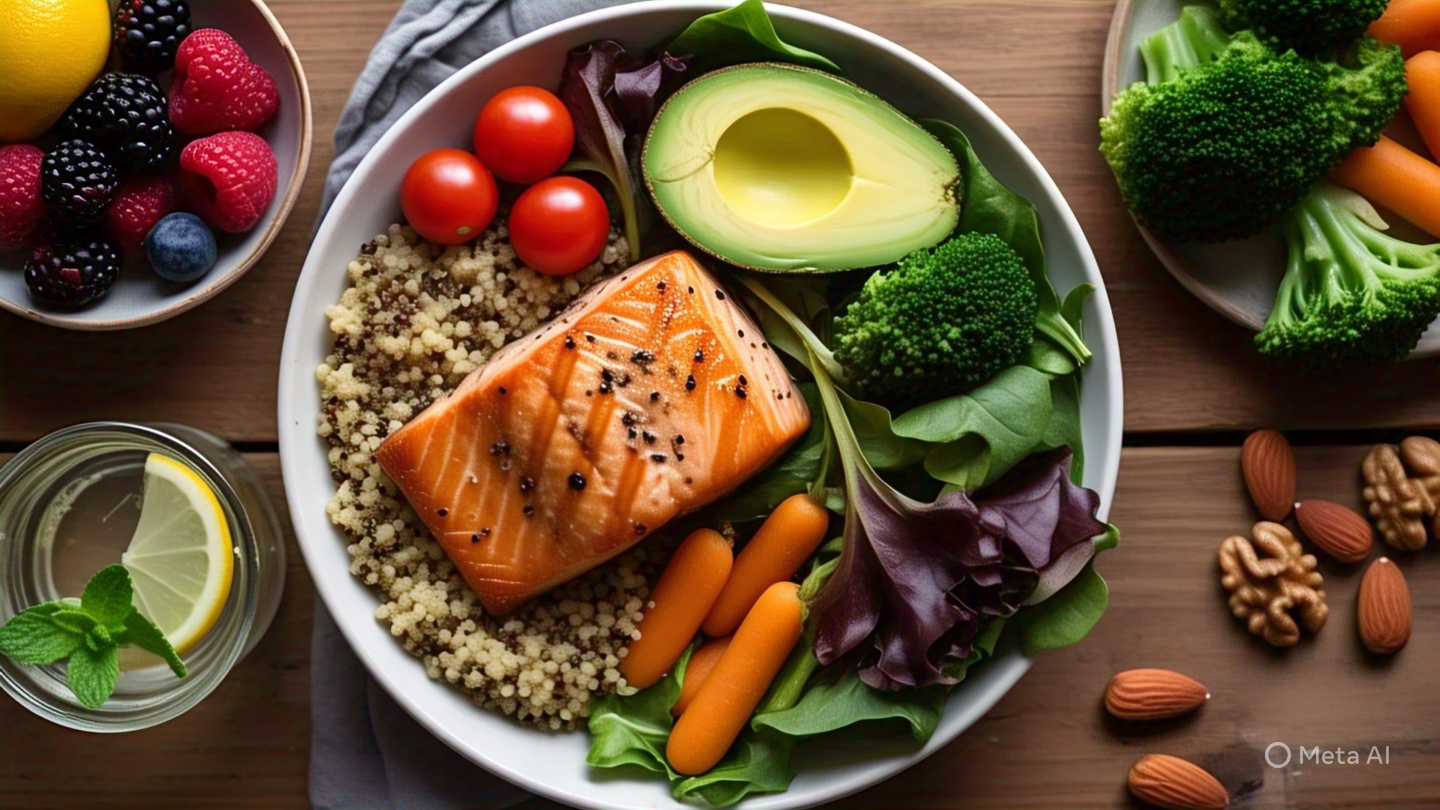Understanding Essential Nutrients
Essential nutrients are the building blocks of a healthy body, crucial for maintaining overall well-being.
These nutrients are classified into two main categories: macronutrients and micronutrients.
Macronutrients include carbohydrates, proteins, and fats, which provide the energy and structure our bodies need.
Micronutrients, on the other hand, encompass vitamins and minerals that support various bodily functions, even in small amounts.
What Are Macronutrients and Micronutrients?
Macronutrients are the nutrients required in larger quantities to fuel our daily activities.
Carbohydrates offer energy, proteins are essential for growth and repair, and fats provide long-term energy storage.
Micronutrients, including vitamins like C and D and minerals like calcium and iron, are needed in smaller amounts but are equally important for processes such as immune function and bone health.
A balanced intake of both macronutrients and micronutrients is vital for achieving optimal health.
The Role of Nutrients in Body Functioning
Nutrients play a pivotal role in numerous bodily functions, including metabolism, immune response, and cell repair.
For instance, proteins are vital for muscle development, while carbohydrates are the body’s primary energy source.
Vitamins and minerals support essential biochemical reactions and help maintain energy levels.
Without adequate nutrients, our bodies may struggle to function efficiently, leading to fatigue and other health issues.
Common Nutrient Deficiencies
Despite the availability of food, many individuals experience nutrient deficiencies.
Common deficiencies include vitamin D, iron, and calcium, often due to insufficient dietary intake or absorption issues.
These gaps can lead to health problems such as osteoporosis, anemia, and weakened immune responses.
Recognizing and addressing these deficiencies through diet can significantly improve health outcomes.
The Importance of a Balanced Diet
A balanced diet is essential for overall health and well-being. It includes a variety of foods from all food groups, ensuring that we get the necessary nutrients our bodies need to function optimally.
Studies indicate that a well-rounded diet can prevent chronic diseases such as heart disease, diabetes, and obesity, while also promoting longevity.
By focusing on a diverse array of foods, we can support our immune system, enhance our energy levels, and improve our mental health.
Food Groups You Should Include
To achieve a balanced diet, it’s important to incorporate foods from all major food groups: fruits, vegetables, whole grains, proteins, and dairy.
Fruits and vegetables provide essential vitamins, minerals, and antioxidants that help fight inflammation and disease.
Whole grains offer fiber and nutrients that support digestive health, while proteins—whether from meat, dairy, or plant sources—are crucial for muscle repair and growth.
Lastly, dairy or dairy alternatives supply calcium and vitamin D for strong bones.
How Diversity in Diet Boosts Health
Diversity in our diet is key to receiving a full spectrum of nutrients.
Different foods contain varying combinations of vitamins, minerals, and phytochemicals that work synergistically to enhance health.
For instance, consuming a colorful plate of fruits and vegetables can provide a wide range of antioxidants, each offering unique health benefits.
By exploring various food options and recipes, you not only keep meals exciting but also optimize your nutritional intake.
Misconceptions About Dieting
Many people believe that dieting means restricting food intake, but this is a misconception.
A balanced diet should focus on inclusion rather than exclusion, allowing for all food groups in moderation.
Restrictive diets can lead to nutrient deficiencies and unhealthy relationships with food.
Instead of eliminating foods, aim to enjoy a variety of choices, which fosters a more sustainable and healthy approach to eating.
Top Food Sources for Essential Nutrients

Whole foods are your best allies in obtaining essential nutrients. These foods, which include fruits, vegetables, whole grains, and proteins, are packed with vitamins, minerals, and antioxidants that support overall health. Research consistently shows that whole foods offer higher nutritional value compared to processed alternatives, which often lack the necessary nutrients and may include unhealthy additives.
Fruits and Vegetables: Nature’s Powerhouses
Fruits and vegetables are vital for a balanced diet, providing a myriad of essential nutrients. They are rich in vitamins A, C, and K, along with fiber and antioxidants that combat inflammation and chronic diseases. Aim to fill your plate with a rainbow of colors, as different hues often indicate a variety of beneficial compounds. Seasonal produce can be particularly nutrient-dense, so explore local markets to discover fresh options.
Whole Grains vs. Processed Grains
Whole grains, such as brown rice, quinoa, and whole wheat bread, retain their bran and germ, making them rich in fiber, vitamins, and minerals. In contrast, processed grains often lose these beneficial components during refining. Incorporating whole grains into your meals can enhance digestive health and provide sustained energy. Look for labels that say “100% whole grain” to ensure you are making the healthiest choice.
Protein Sources: Meat, Dairy, and Plant-Based Options
Protein is essential for building and repairing tissues, and there are numerous sources to choose from. Animal products like lean meats and dairy provide high-quality protein along with essential amino acids. For those opting for plant-based diets, legumes, nuts, seeds, and tofu are excellent alternatives. Combining different protein sources can also help ensure you get all the necessary amino acids your body needs for optimal functioning.
Meal Planning for Nutritional Success
Effective meal planning is a cornerstone for achieving nutritional success. By taking the time to plan your meals, you can ensure that you’re consistently obtaining all the essential nutrients your body needs. Studies indicate that pre-planned meals significantly reduce the likelihood of nutrient gaps, allowing for a more balanced diet.
Creating a Weekly Meal Plan
To begin, create a weekly meal plan that incorporates a variety of foods from all food groups. Start by selecting recipes that feature fruits, vegetables, whole grains, and lean proteins. Aim for diversity to cover different nutrients. Designate specific days for certain meals, and don’t forget to include healthy snacks. This structure not only simplifies your grocery shopping but also streamlines your cooking process, making it easier to stick to your nutritional goals.
Portion Control and Serving Sizes
Understanding portion control is vital in meal planning. Familiarize yourself with recommended serving sizes to avoid overeating or undereating. Use measuring cups or a food scale to help you gauge the right amounts, particularly when it comes to calorie-dense foods. By keeping portions in check, you can enjoy a variety of foods while still achieving a balanced intake of essential nutrients.
Shopping Tips for Nutrient-Dense Foods
When shopping for nutrient-dense foods, focus on whole, unprocessed items. Create a shopping list based on your meal plan to avoid impulse buys. Look for seasonal produce, as these are often fresher and more affordable. Additionally, consider buying in bulk for non-perishable items like grains and legumes. This strategy not only saves money but also ensures that your kitchen is stocked with nutritious options to support your meal planning efforts.
Cooking Methods That Preserve Nutrients
Cooking methods can significantly impact the nutrient content of your food.
Certain techniques help retain essential vitamins and minerals while enhancing flavors.
Research indicates that steaming and baking are particularly effective, as they minimize nutrient loss compared to frying or boiling.
Best Cooking Techniques for Nutrient Retention
Steaming is one of the best methods for preserving nutrients, especially in vegetables.
This technique cooks food quickly without submerging it in water, which can leach out vitamins.
Baking is another excellent option, particularly for proteins and some vegetables, as it enhances flavor while maintaining nutrient integrity.
Grilling can also be a healthy choice, provided it is done at the right temperature to avoid charring.
Avoiding Nutrient Loss During Preparation
Before cooking, how you prepare your ingredients can also affect nutrient retention.
For instance, avoid peeling fruits and vegetables when possible, as many nutrients are found in the skin.
Cutting produce into large pieces can reduce exposure to air and heat, helping to preserve more nutrients during cooking.
Additionally, try to minimize cooking time; the shorter the cooking duration, the more nutrients remain intact.
Easy Recipes to Maximize Nutrient Intake
To maximize nutrient intake, consider simple recipes like steamed broccoli with garlic and lemon.
Another quick option is baked salmon with a side of roasted sweet potatoes, which retains vitamins and minerals while being delicious.
Try a colorful stir-fry using a variety of vegetables, cooked quickly over high heat to keep them crisp and nutrient-rich.
These methods not only enhance flavor but also ensure you’re getting the most out of your meals.
Listening to Your Body’s Nutritional Needs
Understanding your body’s signals is crucial for identifying nutritional gaps and making informed dietary choices. Many people are unaware of their specific nutrient needs, often leading to deficiencies that can affect overall health. Paying attention to how you feel after meals, your energy levels, and even your cravings can reveal much about your nutritional status.
Recognizing Signs of Deficiency
Common signs of nutrient deficiencies include fatigue, skin issues, and frequent illnesses. For instance, a lack of iron can lead to constant tiredness, while insufficient vitamin C may manifest as easily bruised skin. Being attuned to these symptoms can help you address gaps in your diet. Keep an eye on how your body reacts to different foods and consider consulting a healthcare professional for tailored advice.
The Importance of Mindful Eating
Mindful eating encourages you to focus on the experience of eating, helping you recognize hunger and fullness cues. By slowing down and savoring each bite, you can better understand what your body craves and needs. This practice can also improve digestion and increase satisfaction, reducing the likelihood of overeating.
Tracking Nutritional Intake Effectively
Keeping a food journal or using a nutrition tracking app can provide insight into your dietary habits. By logging what you eat, you can identify patterns and areas for improvement. This practice not only helps in recognizing deficiencies but also empowers you to make conscious choices that align with your health goals. Regularly reviewing your intake can lead to more balanced meals and better nutrient coverage.
Making Nutrition Affordable: Tips and Tricks
Eating a nutritious diet doesn’t have to break the bank. With smart shopping and meal prep strategies, you can enjoy a variety of healthy foods without overspending. Studies show that home-cooked meals are generally less costly than dining out or purchasing pre-packaged options, making it easier to keep your nutrition on track while staying within budget.
Budget-Friendly Food Swaps
When trying to eat healthy on a budget, consider making simple food swaps. For instance, replace expensive protein sources like steak with more affordable options like beans, lentils, or eggs. Additionally, choose frozen fruits and vegetables instead of fresh ones, as they are often cheaper and just as nutritious. Opting for store brands can also lead to significant savings while still providing quality nutrition.
Utilizing Local and Seasonal Produce
Buying local and seasonal produce is another effective way to save money while eating healthily. Local farmers’ markets often offer fresh fruits and vegetables at lower prices compared to grocery stores. Seasonal items are usually harvested at their peak, ensuring better flavor and nutritional value. Incorporating these fresh ingredients into your meals not only supports local agriculture but also enhances your diet.
Batch Cooking to Save Time and Money
Batch cooking is a practical approach that can help you save both time and money. By preparing larger quantities of meals in advance, you can avoid last-minute takeout and reduce food waste. Cook grains, proteins, and vegetables in bulk, then store them in the fridge or freezer for easy access during the week. This not only saves money but also makes it more convenient to stick to a nutritious diet.
